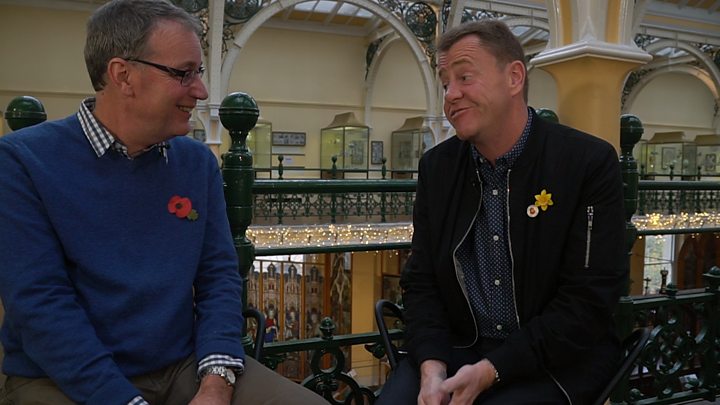
Image copyright
Peter Bagnall
Breast cancer is a disease that overwhelmingly affects women, but men get it too. Peter Bagnall is one of them.
Peter, 56, who is from Birmingham, got in touch with BBC Radio 5 Live during a discussion about women choosing to “go flat” instead of having reconstruction after breast cancer.
Here, in this own words, is Peter’s story of how he struggled following his breast cancer diagnosis, and how he and his partner Lorraine, who also had the condition, coped.
“When I got breast cancer I was sucked into a world of which I wasn’t a part.
My partner Lorraine got breast cancer in 2006 so I know a bit about what women go through. She had a lumpectomy, but then they had to take off the whole breast.
When I found a lump under my nipple in 2013, I didn’t think it was breast cancer.
If it was not for Lorraine, I wouldn’t have even gone to the doctors. I felt a bit of a fraud.
The doctor immediately sent me to the hospital and after a biopsy it got confirmed as breast cancer.
It was a total shock. I didn’t know men could get it.
- Football chief calls for male breast cancer screening
- ‘I never knew men could get breast cancer’
- Male sex hormones ‘drive breast cancer’
Around 390 men are diagnosed with breast cancer each year in the UK, while 55,000 women are diagnosed with the disease.
As a man I felt like a lone voice. Even going for an MRI scan, all the waiting areas say “female only”, the model they showed me was a female model, there was nothing for me to feel a part of it.
I felt like a footnote to cancer.
Image copyright
Getty Images
The pink ribbon is a symbol of breast cancer awareness
When you tell people you have got breast cancer they are always amazed, shocked. That makes it even harder, you feel a bit of a freak.
People said to me: ‘It’s not as bad as a woman getting it’. I thought ‘Well, it is. It’s still cancer.’
I still had to have the operations, I still had to have treatment. When they say ‘a woman feels less of a woman’ when she has a mastectomy, well I felt less of a man.
Feeling lopsided
After I had a mastectomy, I felt terrible looking in the mirror. I always thought I didn’t have a body image problem as a man, but I felt lopsided.
I knew people did not see I had a “moob” on one side and nothing on the other, but I still felt everybody was looking at me.
I was not offered the chance to go flat or reconstruction. I spoke to them about it, but it came across that they thought I was weird for wanting another mastectomy. I just wanted both sides to be the same.
Six months later I tried to cut it off myself, I know that sounds extreme, but that is where I was.
The rational side of me knew it was not a big deal, but the emotional side drove me to try and cut it off.
One night, at about 02:00, I went down to the kitchen and started cutting it. It was Lorraine who came down and stopped me.
I was not sectioned but I was house-sectioned, which meant I had to stay at home for two weeks.
If it had not been for the psychiatrists, I do not think I would have been able to have another mastectomy.
In the end I got the double mastectomy.
There were two different departments, and it was a fight for the mental health side to get through to the breast side to make them aware “he really needs this”.
Our cancer journeys
Image copyright
Peter Bagnall
Peter and Lorraine supported each other through their “cancer journeys”
Lorraine and I did everything together, through both our cancer journeys. She was very supportive. We were always at each other’s appointments.
In 2016 Lorraine went into hospital with severe back pain, and two days later they told us “it’s bone cancer from breast”. They put her straight back on the antihistamine drug and then she had chemotherapy.
We had the best 18 months we could have possibly had. We talked about everything that you could possibly talk about, things that people don’t talk about, but need to talk about.
We have nine children between us and we had never got round to getting married, but in the hospice we had a blessing of the rings. That was our wedding – 15 days later she died.
The thing that gives me the greatest comfort is I managed to say to Lorraine “you’ve lived your life for everyone else, this is your death please go when you want to go”. Then on the Sunday she said: “Pete, can I go now?”
Tidal wave of grief
In some ways I think my breast cancer was pushed to the back of my mind.
I can deal with grief when I am expecting grief, it is the unexpected ones, the tidal wave that will suddenly come over me.
The last time I had my annual check-up at the hospital it really hit me. It had been a big part of our lives so when I was in the hospital waiting, I started seeing Lorraine walking around. When I got to the breast nurses I was just a blubbering mess.
One of the nurses came over and said “have you ever thought of having nipples?”. It was the first time I had been offered nipple tattoos.
Image copyright
Peter Bagnall
Peter, before and after having nipple tattoos
I went to the hospital and a breast nurse did it for me. It is done like a tattoo but it’s different type of ink.
It was something I had not really thought about, but it has made a huge difference.
Men show nipples more than women do. I was not able to swim for years and years without keeping my top on and I lost the enjoyment of swimming I used to have.
Now when I swim, I feel a lot more confident.
A lonely world
Before, I do not think I had accepted I had breast cancer. I just did not want to tell anyone.
I had been really isolated, I had never seen a group for men with breast cancer, I had never met anyone like me.
It was a very lonely world, I did not know where to reach out.
Five-and-a-half years after getting breast cancer, I finally met another man who had gone through what I had.
I was listening to 5 Live and it was about women choosing to go flat or have reconstruction. I felt neither was offered to me and that made me want to ring up.

Later, 5 Live put me in touch with Giles, who had also had a mastectomy following breast cancer. To speak to another male sufferer, to speak to someone that understood, it helped so much.
It made me feel more normal.
Getting the message out there
I have accepted that I had breast cancer. I suffered from breast cancer, it is something men can get; it feels liberating to be able to say that.
I want to raise awareness that it isn’t a women-only disease, it does happen to men.
I think Lorraine would be proud of me for trying to get the message out there.
There might be someone who reads this, and that one person might feel like they can talk to someone. I know that would make Lorraine happy.



